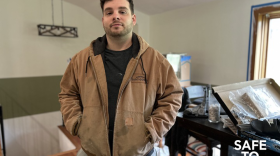New Hampshire was hit with a lawsuit over its new limits on PFAS chemicals in drinking water on the same day the new regulation took effect.
The suit, filed in Merrimack Superior Court, comes from the Plymouth Village Water and Sewer District, a farmer in Center Harbor and a fertilizer company in Holderness, as well as 3M, the original maker of PFAS compounds.
They want the rules reconsidered, calling them an unconstitutional unfunded mandate. Their lawsuit argues the state Department of Environmental Services didn’t account enough for the cost of compliance during its public input process for the new standards.
“We respect the folks at DES and understand their motivation but we believe that it did not have to be this way,” says the Plymouth water district in a statement Tuesday. “It is our hope that this challenge will result in a forced ‘do over’ that can ultimately lead to the environmental protections that we all want at a price that we can all afford.”
The rules apply to public water systems and entities charged with groundwater management. This means some wastewater treatment plants and the fertilizer they generate could be affected. Community and municipal water utilities will face new costs as well.
The standards are the strictest enforceable, regulatory standards for PFAS in public water supplies that any state has formally adopted. PFAS are not subject to hard federal regulations. The state rules that have developed instead are a patchwork.
In a statement, the North East Biosolids and Residuals Association – which works with some wastewater handlers – says they support the lawsuit.
“We too worry about PFAS in the environment, and we are working, same as others, to reduce human exposures,” the NEBRA statement says. “But our municipal systems cannot be held liable and responsible for bearing the cost of addressing a society-wide issue that’s taken 50 years to develop.”
New Hampshire environmental officials did not respond to a request for comment on the Plymouth lawsuit by deadline Tuesday. But they've argued in the past that they did consider the costs and benefits of the new limits appropriately.
The state says say the main costs of the law over the next year will be for testing. Public water systems and others who are out of compliance after that may have to install costly treatment systems.
State officials have said they'll work with local stakeholders -- including the New Hampshire Municipal Association - to develop more funding to cover these compliance costs.
Studies have linked PFAS exposure to serious health problems, though chemical companies like 3M dispute some of that science.
In a statement, a 3M spokeswoman argues that New Hampshire’s new PFAS limits “fail to meet” appropriate regulatory standards or to follow “the best available science.”
The large company is among those being sued by the state for allegedly causing widespread PFAS contamination in New Hampshire’s water supplies. The company also operates a manufacturing facility in Tilton.








